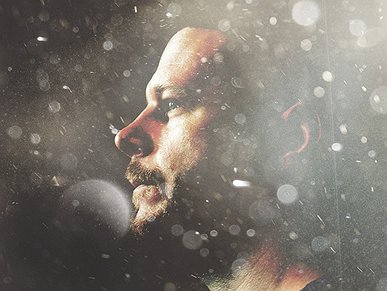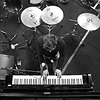Part 1
Name:Richard J. Birkin
Nationality: British
Occupation: Composer / sound artist / performer / creative technologist
Labels: Reveal Records
Musical Recommendations: The new GoGo Penguin album is really wonderful / And the new album by Niagara is a great listening experience.
When did you start composing - and what or who were your early passions and influences?
I started as soon as I knew how to play things. After my first guitar lesson I knew three chords and started writing with those. That probably turned into ‘composing’ when I got my first Tascam four-track tape recorder and I could layer guitars, pianos and anything else that was lying around.
My passion has always been for making things. I like to understand how things are made - whether it’s music or physical objects. In the last ten years, this passion has led me to listen closely to classical music and soundtracks, to hone in on the details and figure them out for myself.
Early influences were indie music - those first guitar chords made my neighbour bring Oasis and Teenage Fanclub CDs round, and I would figure out how to play them so I could teach him too. I still listen to a lot of those records now, and when I hear string arrangements like those on ‘Whatever’ by Oasis, or REM’s Automatic For The People or Jeff Buckley’s Grace, I can sort of see where the seeds for my current passion was sown.
For most artists, originality is first preceded by a phase of learning and, often, emulating others. What was this like for you? How would you describe your own development as an artist and the transition towards your own voice?
There was an early period of literally copying things I heard, picking them out on piano and doing little kid things with them.
I’m not sure what my own voice is. I know what feels right, and I know what I want something to sound like when I’m creating it. That changes over time too, I think. My development as an artist is definitely still continuing…and at a more rapid pace than ever as I do more, absorb more, learn more. It’s a constant thing.
What were some of the most important creative challenges when starting out as a composer and how have they changed over time?
When starting out, my own personal challenge was finishing things. That has as much to do with confidence as it does with procrastination. You should never let what you think other people might think about your work hold you back from making it, and making it the way you want to make it.
For the new album ‘Vigils’ I wanted to explore string arrangements. So the challenges were things like “how to afford to work with professional players;” “how to direct them to sound like I think they should”, and how to have the confidence to do that.
The challenge now is not to sit in a comfortable creative place for too long, to search for and chase new ideas, and to not be sidetracked by the worry that what I might make in the near future may not fit into the mould that is the present.
Tell us about your studio/work space, please. What were criteria when setting it up and how does this environment influence the creative process? How important, relatively speaking, are factors like mood, ergonomics, haptics and technology for you?
It’s a nice loft space above a photography studio in the small Derbyshire town of Belper. The criteria was to have a space to fit a piano inside, and to have a bit of shelter from outside noise. That’s it really. I’m not making complicated recordings here, I’m just writing (and I need a real piano to do that - the timbre is an inspiration in itself) and doing some basic tracking upon which recordings will be developed.
I find massive inspiration from accidents, drones and resonance. When I’m quickly recording ideas on a guitar or piano, I hear the overtones coming from another part of the room, or some kind of resonance in the instrument or amp, and that's what inspires the piece to move forward in a unique way. There are notes the viola plays in Vigil I that I would not have composed that way, if it weren’t for hearing a hum at that pitch while mixing the piano parts.
But I don’t just write music - I make things, I chase other creative ideas. So rather than perfecting sonic qualities here, I’m just trying to make a space where it’s possible and permissible to lose myself for hours at a time.
Could you take me through the process of composing on the basis of one of your pieces that's particularly dear to you, please? What do you start with when working on a new piece, for example, how do you form your creative decisions and how do you refine them?
‘Moonbathing’ came out of a synth drone I was working on just for fun. All these overlapping tones. I sat back to enjoy them and picked up a guitar and just started playing that picking pattern. The whole guitar part came really quickly, which is usually a sign that things are going well.
After that it was a long, slow process to get to how it sounds now. I jammed it with a band. I toured it with a string duo. I played it solo, which is how those vocal loops happened. In all of these versions, something would stick, and the challenge would be to let other things go - not because they weren’t good, but because they didn’t fit with where the song was going.
This piece was only finished when I went back and re-recorded the string section (which had only been written for the first half of the piece) to factor in the end of the song, which was only clear to me after the electric guitars had been tracked.
If I had to choose one phrase to describe my process it would be ‘constant revision’.
What, if anything, do you personally draw from the cosmos of electronic music and digital production tools that is inspiring for your daily practice? In how far do you see the potential for a mutual creative pollination between the two?
Electronic music is inspiring to me because there’s a lot of fine detail in there, and that detail is often manic or made up of an unusually varied palette of sounds. Take Squarepusher: there’s so much going on there, but if you get your head inside ‘Ultravisitor', you begin to notice what he’s doing with timing, timbre, repetition, manipulation, dynamics, aural space.
Because I’m not hugely knowledgeable about how to make electronic music, it’s a style that can mystify me because I literally have NO IDEA how they’re making this magic.
I use digital tools to write quickly - string samples allow me to get ideas out of my head, and are decent enough to let me know that when the parts are played by real people, that they will work and be good. Synths are great to try and nail a sound that is in your head but you don’t know what it is. On ‘Accretions’ I had that big chord ‘stab’ in my head from the get-go, and played with effects and sounds for hours trying to find a way to make it real.
How do you see the relationship between timbre and composition?
Timbre has a direct influence on composition. On a certain type of piano I can write things instantly. By finger picking the same note on a different string, closer to the neck of the guitar than the bridge - that move alone can make a piece progress.
I’m not academic, so I think it’s the sound rather than the compositional theory that created it that really makes my brain buzz with pleasure.
Time is a variable only seldomly discussed within the context of contemporary composition. Can you tell me a bit about your perspective on time in relation to a composition and what role it plays in your work?
There is a lot of unmetered space in some of the Vigils pieces. I would only play the next note when the others had died down, for example. I wanted to achieve a kind of stasis - while the piece was being played or listened to then time would pass differently.
Time only becomes an issue when you bring in other people. Unless it’s an amorphous piece you’re working on, you need a common procession of time so that you’re all in sync.






